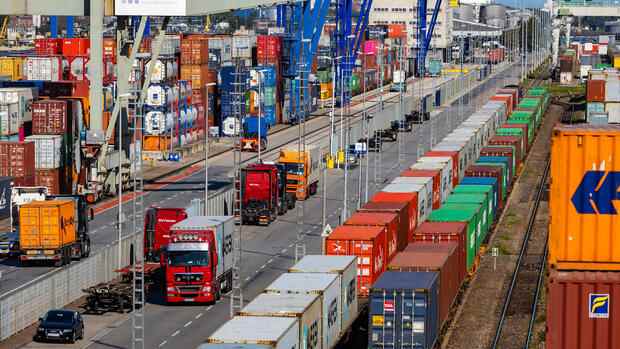Energy sources should be given priority.
(Photo: imago images/Arnulf Hettrich)
Berlin The Federal Ministry of Economics and Transport have agreed on an ordinance that will allow important transports for the energy supply to be transported primarily by rail in the future.
The preference is justified with the Ukraine war and the consequences for the energy supply. “In order to prevent an immediate threat to or disruption of the energy supply in Germany, a different logistical planning of energy transport and large transformers has become necessary,” says the reasoning in the draft, which is available to the Handelsblatt.
Accordingly, such transports have priority on the rail network. The draft was sent to the associations for a hearing this Thursday. You have to comment on the draft by tomorrow, Friday, 5 p.m. After that, the regulation should come into force immediately and initially apply for six months.
The aim is to secure the country’s energy supply, for example to supply power plants with coal or refineries with oil should the Russian Druzhba pipeline fail completely.
Top jobs of the day
Find the best jobs now and
be notified by email.
Freight transport companies in particular will suffer. They have been experiencing extensive bottlenecks in the rail network since last winter and are having problems running their trains on time. Hundreds of trains sometimes stood still and were cancelled. A number of companies have already suffered major damage as a result. But passenger trains can also be canceled at short notice in the future to allow energy transport through.
“Claims Excluded”
The problem is well recognized in the regulation – and for this reason there should be no compensation if their slots for normal goods transport are terminated by DB Netz AG as the operator of the rail network in order to then release them for energy transport. “This can cause significant damage, including consequential damage, to those affected by the fact that passenger and goods traffic cannot be carried out,” says the justification for the regulation.
This could result in refunds from passenger rights or penalties due to non-delivery or late deliveries. “Claims against the operator of the railways and the operator of the service facilities, who dutifully implement the regulation, are excluded,” the regulation therefore explicitly says, “except for breaches of duty based on gross negligence or intent”. This is the only way operators can be expected to implement the regulation.
In the future, “already contractually agreed train paths or already contractually agreed uses of capacities in service facilities can be canceled without observing a period of notice,” says the regulation. In this case, the Federal Network Agency as the regulatory authority must be informed “immediately”. The applicant must justify why the transport is urgent. He must register it with the network operator five days in advance.
Priority applies to the so-called “energy corridor network” that leads from Hamburg, Berlin, Neustadt an der Donau or Duisburg to refinery or power plant locations. The list alone comprises 31 pages.
More: Infrastructure: Germany needs a modernization plan
